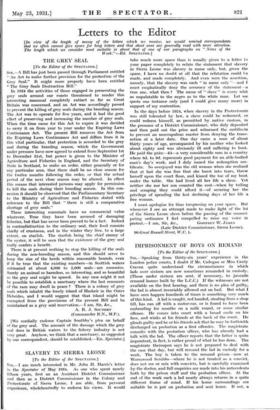SLAVERY IN SIERRA LEONE
[To the Editor of the SPECTATOR.] SM,—I am much interested in Mr. John H. Harris's letter in the Spectator of May 16th. As one who spent nearly fifteen years, first an an Assistant District Commissioner and then as a District Commissioner in the Colony and Proteetoiate of Sierra Leone, I am able, from personal experience, wholeheartedly to endorse his views. It would take much more space than is usually given to a letter is your paper completely to refute the statement that slavery in Sierra Leone was slavery in name only, but, given the space, I have no doubt at all that the refutation could . i e made, and made completely. And even were the assertion, namely, that the slavery was such " in name only "—and I must emphatically deny the accuracy of the statement—a true one, what then ? The name of " slave " is every whit as unpalatable to the negro as to the white man. Let me quote one instance only (and I could give many more) in support of my contention.
In the days before 1924, when slavery in the Protectorate was still tolerated by law, a slave could be redeemed, or could redeem himself, as permitted by. native custom, in the presence of a District Commissioner, who duly deposited and then paid out the price and witnessed the certificate to prevent an unscrupulous master from denying the trans- action at a later date. One day came a man of about thirty years of age, accompanied by his mother who looked about eighty and was obviously ill and suffering to boot. He paid the price—£4—a very considerable sum in a country where 6d. to 9d. represents good payment for an able-bodied man's day's work, and I duly issued the redemption cer- tificate. So overjoyed was the old woman when she realized that at last she was free that she burst into tears, threw herself upon the court floor, and kissed the toe of my boot under the table. She had lived all her life a slave. Yet neither she nor her son counted the cost—when by toiling and scraping they could afford it—of securing her the privilege of spending the last declining days of her life a free woman.
I must apologize for thus trespassing on your space. But whenever I see an attempt made to make light of the lot of the Sierra Leone slave before the passing of the emanci- pating ordinance I feel compelled to raise my voice in
protest.—I am, Sir, &c., GODFREY W. JAMES (Late District Commissioner, Sierra Leone). 90 Great Russell Street, W .C. 1.






































 Previous page
Previous page